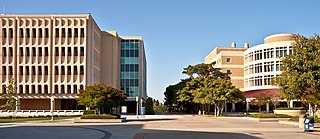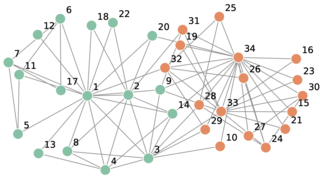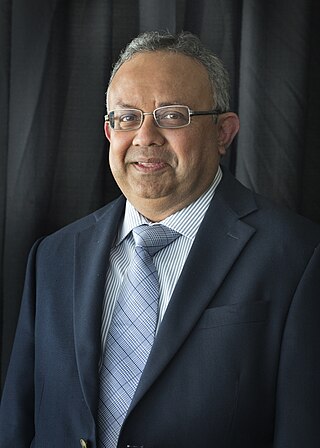Related Research Articles

Andrew Chi-Chih Yao is a Chinese computer scientist and computational theorist. He is currently a professor and the dean of Institute for Interdisciplinary Information Sciences (IIIS) at Tsinghua University. Yao used the minimax theorem to prove what is now known as Yao's Principle.
José Leite Lopes was a Brazilian theoretical physicist who worked in the field of quantum field theory and particle physics.
José Fernando F. Mendes is a Portuguese physicist and professor of physics, best known for his work and contributions to the field of network theory.Graduated from University of Porto in 1987. He earned a PhD in March 1995 from the same University under the direction of Eduardo Lage, the title of the thesis was "Dynamics of spins systems".

In the study of complex networks, a network is said to have community structure if the nodes of the network can be easily grouped into sets of nodes such that each set of nodes is densely connected internally. In the particular case of non-overlapping community finding, this implies that the network divides naturally into groups of nodes with dense connections internally and sparser connections between groups. But overlapping communities are also allowed. The more general definition is based on the principle that pairs of nodes are more likely to be connected if they are both members of the same community(ies), and less likely to be connected if they do not share communities. A related but different problem is community search, where the goal is to find a community that a certain vertex belongs to.

The School of Physical Sciences is an academic unit of the University of California, Irvine (UCI) that conducts academic research and teaching in the field of physical sciences. It offers both pre-professional training and general education in the departments of chemistry, earth system science, mathematics, and physics and astronomy. The school enrolls 1,400 undergraduate and graduate students and is one of the top schools in the nation in the number of degrees it confers in the area of physical sciences. It also offers specializations such as biochemistry, statistics, math for economics, applied and computational mathematics, astrophysics, applied physics, biomedical physics, and education. In 1995, the school gained international prominence when Frank Sherwood Rowland, a professor in chemistry and Frederick Reines, a professor in physics, won the Nobel Prize in their respective fields. It was the first time two people won the prize in the same year in two different fields at the same public university.
Mark Newman is a British physicist and Anatol Rapoport Distinguished University Professor of Physics at the University of Michigan, as well as an external faculty member of the Santa Fe Institute. He is known for his fundamental contributions to the fields of complex systems and complex networks, for which he was awarded the Lagrange Prize in 2014 and the APS Kadanoff Prize in 2024.
Navin Madhavprasad Singhi is an Indian mathematician and a Professor Emeritus at Tata Institute of Fundamental Research, Mumbai, specializing in combinatorics and graph theory. He is the recipient of the prestigious Shanti Swarup Bhatnagar Prize for Science and Technology. Singhi is known for his research in block designs, projective planes, Intersection graphs of hypergraphs, and coding theory. He was a visiting professor at IIT Mumbai, University of Mumbai, Indian Statistical Institute and other various universities in the United States and Europe.

Tiago André Barata Feio Peixoto Apolónia is a Portuguese table tennis player for German club TTF LIEBHERR Ochsenhausen and Portugal. As of August 2016, he is ranked the number eighteenth player in the world.
Cristopher David Moore, known as Cris Moore, is an American computer scientist, mathematician, and physicist. He is resident faculty at the Santa Fe Institute, and was formerly a full professor at the University of New Mexico. He is an elected Fellow of the American Physical Society, the American Mathematical Society, and the American Association for the Advancement of Science.

Milton Hatoum is a Brazilian writer, translator and professor. Hatoum is one of Brazil's most eminent contemporary writers. Among other honors, Hatoum was awarded Brazil's most prestigious literary award, the Jabuti Prize, three times for best novel. In 2017, he received the title of Officier de L'Ordre des Arts et des Lettres from the French government.
The Erdős–Rényi Prize of the Network Science Society is named after Paul Erdős and Alfréd Rényi. This international prize is awarded annually in a special ceremony at the International Conference on Network Science to a selected young scientist for their research achievements in the area of network science, broadly construed. While the achievements can be both theoretical and experimental, the prize is aimed at emphasizing outstanding contributions relevant to the interdisciplinary progress of network science.

Zachary's karate club is a social network of a university karate club, described in the paper "An Information Flow Model for Conflict and Fission in Small Groups" by Wayne W. Zachary. The network became a popular example of community structure in networks after its use by Michelle Girvan and Mark Newman in 2002.
Aaron Clauset is an American computer scientist who works in the areas of Network Science, Machine Learning, and Complex Systems. He is currently a professor of computer science at the University of Colorado Boulder and is external faculty at the Santa Fe Institute.
Krista Jennifer Gile is an American statistician known for her research on respondent-driven sampling, on exponential random graph models, and more generally on the statistical behavior of social networks. She is an associate professor in the department of mathematics and statistics of the University of Massachusetts Amherst.

Dipak Kumar Dey is an Indian-American statistician best known for his work on Bayesian methodologies. He is currently the Board of Trustees Distinguished Professor in the Department of Statistics at the University of Connecticut. Dey has an international reputation as a statistician as well as a data scientist. Since he earned a Ph.D. degree in statistics from Purdue University in 1980, Dey has made tremendous contributions to the development of modern statistics, especially in Bayesian analysis, decision science and model selection. Dey has published more than 10 books and edited volumes, and over 260 research articles in peer-refereed national and international journals. In addition, the statistical methodologies that he has developed has found wide applications in a plethora of interdisciplinary and applied fields, such as biometry and bioinformatics, genetics, econometrics, environmental science, and social science. Dey has supervised 40 Ph.D. students, and presented more than 200 professional talks in colloquia, seminars and conferences all over the world. During his career, Dey has been a visiting professor or scholar at many institutions or research centers around the world, such as Macquarie University, Pontificia Universidad Católica de Chile,, University of São Paulo, University of British Columbia, Statistical and Applied Mathematical Sciences Institute, etc. Dey is an elected fellow of the American Association for the Advancement of Science, the American Statistical Association, the Institute of Mathematical Statistics, the International Society for Bayesian Analysis and the International Statistical Institute.
Stefan Roth is a German computer scientist, professor of computer science and dean of the department of computer science of the Technische Universität Darmstadt. He heads the Visual Inference Lab.
Alexandre Pouget is a full Professor at the University of Geneva in the department of basic neurosciences.
Michelle Girvan is an American physicist and network scientist whose research combines methods from dynamical systems, graph theory, and statistical mechanics and applies them to problems including epidemiology, gene regulation, and the study of Information cascades. She is one of the namesakes of the Girvan–Newman algorithm, used to detect community structure in complex systems.

Tiago Carneiro Peixoto is a Brazilian political scientist and Senior Governance Specialist at the World Bank, who promotes participatory democracy and digital government around the globe. Recognized as an expert in e-democracy and participatory democracy, he was nominated as one of the most innovative people in democracy, as well as one of the 100 most influential people in digital government.
Yoshiko Wakabayashi is a Brazilian computer scientist and applied mathematician whose research interests include combinatorial optimization, polyhedral combinatorics, packing problems, and graph algorithms. She is a professor in the department of computer science and institute of mathematics and statistics at the University of São Paulo.
References
- 1 2 3 "Tiago's Personal Page" . Retrieved 2019-09-23.
- ↑ "graph-tool: Efficient network analysis with python" . Retrieved 2020-08-17.
- ↑ Peixoto, Tiago de Paula (2007). USP Thesis and Dissertations (Thesis). University of São Paulo. doi: 10.11606/T.43.2007.tde-01042008-105854 . Retrieved 2019-09-23.
- ↑ "Dr Tiago Peixoto wins prestigious award". University of Bath. Retrieved 2019-09-23.
- ↑ Zachary Karate Club CLUB prize, retrieved 2019-10-22.